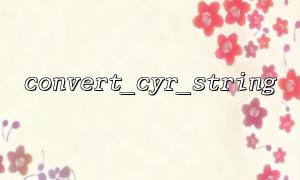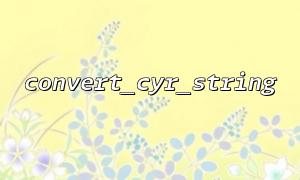In PHP, string encoding conversion and cleanup are very common operations. When handling text in different encoding formats—especially in cross-platform applications or involving external data sources—ensuring the correctness and consistency of characters can be challenging. convert_cyr_string and str_replace are both useful tools in PHP, and today we’ll explore how they can work together to achieve encoding cleanup and text normalization.
convert_cyr_string is a PHP function used for Cyrillic character encoding conversion. Cyrillic is an alphabet system used in many Eastern European languages. If you’re working with text that contains Russian or other languages using the Cyrillic alphabet, convert_cyr_string becomes particularly useful.
The function’s prototype is:
<span><span><span class="hljs-title function_ invoke__">convert_cyr_string</span></span><span> ( </span><span><span class="hljs-keyword">string</span></span><span> </span><span><span class="hljs-variable">$str</span></span><span> , </span><span><span class="hljs-keyword">string</span></span><span> </span><span><span class="hljs-variable">$from</span></span><span> , </span><span><span class="hljs-keyword">string</span></span><span> </span><span><span class="hljs-variable">$to</span></span><span> ) : </span><span><span class="hljs-keyword">string</span></span><span>
</span></span>$str: The string to be converted.
$from: The source encoding, such as 'koi8-r', 'win-1251', etc.
$to: The target encoding, such as 'koi8-r', 'utf-8', etc.
For example, if we have a piece of text encoded in KOI8-R, we can convert it to UTF-8 using convert_cyr_string:
<span><span><span class="hljs-variable">$text</span></span><span> = </span><span><span class="hljs-string">"Привет мир"</span></span><span>; </span><span><span class="hljs-comment">// KOI8-R encoding</span></span><span>
</span><span><span class="hljs-variable">$converted_text</span></span><span> = </span><span><span class="hljs-title function_ invoke__">convert_cyr_string</span></span><span>(</span><span><span class="hljs-variable">$text</span></span><span>, </span><span><span class="hljs-string">'koi8-r'</span></span><span>, </span><span><span class="hljs-string">'utf-8'</span></span><span>);
</span><span><span class="hljs-keyword">echo</span></span><span> </span><span><span class="hljs-variable">$converted_text</span></span><span>; </span><span><span class="hljs-comment">// Output: Привет мир</span></span><span>
</span></span>Besides encoding conversion, sometimes we need to clean unnecessary characters from strings, such as special symbols, line breaks, or other unrecognized encodings. In such cases, str_replace can help us replace or remove these characters.
The str_replace function is a PHP tool for replacing strings. Its prototype is:
<span><span><span class="hljs-title function_ invoke__">str_replace</span></span><span>( </span><span><span class="hljs-keyword">mixed</span></span><span> </span><span><span class="hljs-variable">$search</span></span><span> , </span><span><span class="hljs-keyword">mixed</span></span><span> </span><span><span class="hljs-variable">$replace</span></span><span> , </span><span><span class="hljs-keyword">mixed</span></span><span> </span><span><span class="hljs-variable">$subject</span></span><span> ) : </span><span><span class="hljs-keyword">mixed</span></span><span>
</span></span>$search: The character or string to search for.
$replace: The character or string to replace it with.
$subject: The original string where the replacement takes place.
For example, we can use str_replace to replace all newline characters with spaces, or remove extra spaces:
<span><span><span class="hljs-variable">$text</span></span><span> = </span><span><span class="hljs-string">"Hello, \nWorld! \tThis is PHP."</span></span><span>;
</span><span><span class="hljs-variable">$cleaned_text</span></span><span> = </span><span><span class="hljs-title function_ invoke__">str_replace</span></span><span>(</span><span><span class="hljs-keyword">array</span></span><span>(</span><span><span class="hljs-string">"\n"</span></span><span>, </span><span><span class="hljs-string">"\t"</span></span><span>), </span><span><span class="hljs-string">' '</span></span><span>, </span><span><span class="hljs-variable">$text</span></span><span>);
</span><span><span class="hljs-keyword">echo</span></span><span> </span><span><span class="hljs-variable">$cleaned_text</span></span><span>; </span><span><span class="hljs-comment">// Output: Hello, World! This is PHP.</span></span><span>
</span></span>When we need both encoding conversion and character cleanup, convert_cyr_string and str_replace can work very well together. Suppose you have a piece of text containing Cyrillic characters, along with some invalid characters like extra line breaks or non-printable symbols. You can first use convert_cyr_string to handle encoding conversion, then use str_replace to remove unnecessary characters.
For example, if you have text in KOI8-R encoding with embedded line breaks and extra spaces, here’s a cleanup example:
<span><span><span class="hljs-variable">$text</span></span><span> = </span><span><span class="hljs-string">"Привет \nмир! \tЭто \tтестовый \nтекст."</span></span><span>;
</span><span><span class="hljs-comment">// First convert KOI8-R to UTF-8</span></span><span>
</span><span><span class="hljs-variable">$converted_text</span></span><span> = </span><span><span class="hljs-title function_ invoke__">convert_cyr_string</span></span><span>(</span><span><span class="hljs-variable">$text</span></span><span>, </span><span><span class="hljs-string">'koi8-r'</span></span><span>, </span><span><span class="hljs-string">'utf-8'</span></span><span>);
</span><span><span class="hljs-comment">// Then use str_replace to remove extra spaces and line breaks</span></span><span>
</span><span><span class="hljs-variable">$cleaned_text</span></span><span> = </span><span><span class="hljs-title function_ invoke__">str_replace</span></span><span>(</span><span><span class="hljs-keyword">array</span></span><span>(</span><span><span class="hljs-string">"\n"</span></span><span>, </span><span><span class="hljs-string">"\t"</span></span><span>), </span><span><span class="hljs-string">' '</span></span><span>, </span><span><span class="hljs-variable">$converted_text</span></span><span>);
</span><span><span class="hljs-keyword">echo</span></span><span> </span><span class="hljs-variable">$cleaned_text</span></span><span>; </span><span class="hljs-comment">// Output: Привет мир! Это тестовый текст.</span></span><span>
</span></span>By following this method—first using convert_cyr_string to handle encoding issues, then applying str_replace to strip unnecessary characters—you end up with a clean, normalized piece of text.
Although convert_cyr_string itself isn’t directly used for cleaning text, when combined with other functions like str_replace, it becomes an effective way to clean and normalize text, especially when working with different character encodings. With this combination, we can easily perform both encoding conversion and character cleanup, ensuring text consistency across different systems or platforms.
Hopefully, today’s introduction helps you better understand how to use convert_cyr_string and str_replace to handle text encoding and cleanup tasks!
Related Tags:
URL




